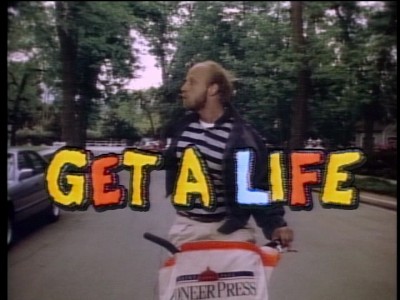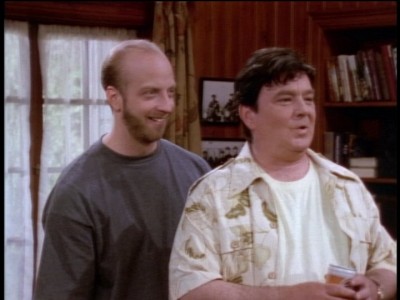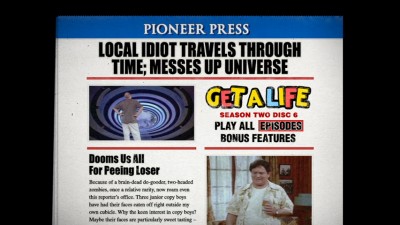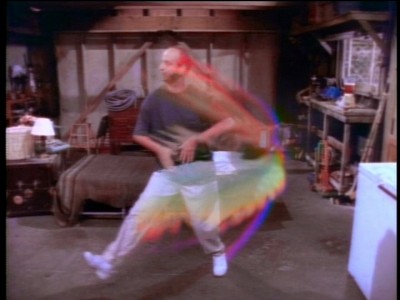| Reviews & Columns |
|
Reviews DVD TV on DVD Blu-ray 4K UHD International DVDs In Theaters Reviews by Studio Video Games Features Collector Series DVDs Easter Egg Database Interviews DVD Talk Radio Feature Articles Columns Anime Talk DVD Savant Horror DVDs The M.O.D. Squad Art House HD Talk Silent DVD
|
DVD Talk Forum |
|
|
| Resources |
|
DVD Price Search Customer Service #'s RCE Info Links |
|
Columns
|
|
|
Get A Life: The Complete Series
Black comedy, sunny-side up

Reviewer's Bias*
Loves: Black comedy, Old Fox comedy series, overloaded extras
Likes: Chris Elliott, Get a Life
Dislikes: The power of nostalgia
Hates: Waiting for DVDs
The Show
In its early days as a network, Fox was legitimately edgy and took chances on shows you wouldn't otherwise see on network TV. Sometimes this resulted in breakthrough shows like the Showtime-developed It's Garry Shandling's Show, The Simpsons and Married...with Children, but too often you got a Top of the Heap or Women in Prison instead (though I'd welcome the chance to revisit the nuclear apocalypse-sitcom Whoops! on DVD. And sets of Duet and Open House would be appreciated.) One of the more unusual, and surprisingly successful fruits of this labor would be Get a Life, a short-lived, yet critically acclaimed show from former Newhart writer and producer David Mirkin and breakout Late Night with David Letterman personality Chris Elliott.
Elliott plays Chris Peterson, a 30-year-old paperboy still living with his frustrated parents (his real dad Bob Elliott and Elinor Donahue), and making life more annoying for his friend Larry (Sam Robards) and his wife Sharon (Robin Riker.) Each episode would be driven by Chris' increasingly hare-brained ideas, be it becoming a male prostitute or saving the neighborhood playground by breaking a world record for having the most garbage piled on him. Along the way, he'd drive those around him insane with his increasingly diminished mental capacity, before failing miserably in his tasks and frequently dying. Calling this black comedy is certainly not a misplaced label. This was basically [adult swim] before [adult swim] was ever even an glimmer in some Turner Broadcast exec's eye.

To be a fan of the show, one must be a fan of Chris Elliott. Few stars are as integral to their series as Elliott, who brought his sense of the unusual to the show, and made everything that happened an extension of his confident awkwardness. Elliott is not the finest looking man on TV, and he made his physique and face into comedy weapons that made his every appearance increasingly funny. It's hard to imagine "The Prettiest Week of My Life," where Chris enrolls in Handsome Boy Modelling School to become a male model, working with anyone else in the lead. As he cries while taking off his shirt for a photo shoot, all the while attempting to pose and appear positive, his look is part of the joke, and it lands perfectly. Once you've seen him as Chris Peterson, it's difficult to picture the idea of a man-child and not have Elliott and his squirrelly face come to mind. That he can play such a defective soul and not drive viewers (well, not all viewers) away from the screen, is a testament to his twisted likeability.
Elliott isn't the only thing to like about the show though, as the cast features a bunch of impressive performers, starting with Elliot and Donahue, who are wonderful as Chris' put-upon parents. Suffering quietly in their ever-present pajamas, reading the paper in their breakfast nook, they are almost entirely unsupportive of Chris, and expect him to fail consistently, but in the clutch, they are there for him, even if that's normally too late to help. As the evil Sharon, Chris' main nemesis, mostly because she was the gatekeeper to his pal Larry, Riker is great, playing a twist on the sitcom housewife of old, a domineering shrew dressed from June Cleaver's closet. When the show really lets her loose in the second season, she gets even more devilish, and the back and forth with her and Chris becomes a highlight of episodes.
The show's first season set the stage for how people remember the series, with the aforementioned modeling episode, "Bored Straight," which has Chris counseling a teen gang, and "The Big City," where Chris is embraced by a major metropolitan city after his wallet is stolen. With Mirkin frequently taking writing and directing chores, along with an assortment of former sitcom stars like Tony Dow and Dwayne Hickman, as well as future GalaxyQuest director Dean Parisot, the show kept a consistent point of view, embracing the classic sitcom format and perverting it so Chris Peterson could fit inside. Family strife (with Jackie Earle Haley as Chris' cousin), celebrity brushes (welcoming talk-show host Martin Mull into the Peterson home) and a trip to the great outdoors (complete with hallucinations) have all been sitcom fodder before, but not like this.
In the abbreviated second season though, the show really caught fire, setting phasers to stunning, and really going for it in terms of surreal comedy. Part of it was probably the influence of new writers Charlie Kaufman (Being John Malkovich) and a pre-Mr. Show Bob Odenkirk (who also served as a story editor) but getting a handle of Chris and his world, which now found him moved out of his parents' house and into a garage belonging to former-cop Gus (Brian Doyle-Murray) really opened up new possibilities. One of the keys to this run is a cartoonish reality that allowed just about anything to happen, seen most prominently in the show's penultimate five episodes. Whether he's getting run over and stabbed while stalking a female scientist, gaining intelligence from toxic waste, finding an alien or traveling back in time to help his friend and landlord Gus, you get a real sense that anything really could happen.
Though Get a Life is cherished by many comedy fans, it's been lost to time for the general public. But if you saw an episode during the show's original run, you'd probably remember that the theme song was the ultra-catchy "Stand" by R.E.M. Shout Factory has ponied up the cash to make these episodes complete, so "Stand" opens each episode, but there's plenty more great music in the episodes that make the show such a product of its time and lend it a serious cachet of hipness. If you can find another network comedy with a montage set to Depeche Mode's "Master and Servant," I'd legitimately like to see it. (And no, Glee is not a comedy, no matter what the Emmys think.) Throughout the series, you get great soundtrack choices, including Roy Orbison's "Pretty Woman," the Bee-Gees' "How Deep is Your Love" and James Brown's "Living in America," all of which are used to great effect.
What's not so great is a the series finale, which is a clip show. Yes, the framework around the clips, which again puts Chris' life in danger, is good, but to have a best-of, such a pedestrian affair, be the end of such a series, it feels like a disappointment. It's not as if there was a grand storyline that needed to be wrapped up, but something a bit more interesting than clips from the previous 34 episodes would have been nice.

The Discs
For this "Un-Special Non-Anniversary Edition," the 35 episodes of Get a Life arrive on six DVDs, packed in a clear single-width keepcase with a pair of dual-hubbed trays. The case comes in a slipcase with a 24-page booklet. The discs feature era-appropriate pillar-boxed full-frame menus with options to play the shows, select episodes and check out the extras. There are no audio options and no subtitles, but closed captioning is included.
The Quality
Presented full-frame, the transfers on these episodes look their age, with a good deal of grain and noise, not to mention some noticeable dirt and specks throughout. The color is good, even if the show looks a touch dark during internal scenes, but there seems to be some issues with compression artifacts. You don't expect a low-budget, 22-year-old TV show to look great, and this one doesn't. It's not terrible, but it won't impress anyone either.
The audio is presented with Dolby Digital 2.0 tracks that are, like the video, good but not great, with center-balanced voices are free of distortion, with nice separation from the music, sound effects and laugh track (where applicable.)
The Extras
The most interesting extras on this set are the optional audio commentaries that appear on every episode. Mirkin is on all of them, sometimes talking through the full episodes, but mostly discussing selected scenes, and is sometimes joined by special guests from the crew or elsewhere. Mirkin has tons of info about the creation of the episodes and a good sense of humor (with plenty of self-deprecation) and does a great job of pointing out details you would probably otherwise miss. What's neat, at least early on, is Mirkin stops the show to expand upon topics, giving you even more entertainment, more than doubling the length of the episode at one point. Hearing about the issues he faced in dealing with the network adds another level of entertainment to the set, and makes it an even more invaluable historical resource for TV fans. Interestingly, when Mirkin is joined by a guest, they are separated in the stereo channels.
Many of the episodes are included with alternate audio that has not added the laugh track heard on TV, showing how ahead of the comedy curve the series could have been. Watching it without all that artificial chuckling (though still with laughs from those on the set) fires home how dark, twisted and genre-perverting the series really could be, and how lucky we are to have the mostly laugh-track-free sitcoms we have today. The strange thing is, the laugh-track ended up being part of the darkness, as this insane audience would laugh at completely inappropriate parts of the show. Even so, it would have been better without it.
Disc Six offers the bulk of the non-commentary, non-non-laugh track extras, starting with "Looking for Noise," a 28:48 history of the series' creation, with several participants, including Mirkin (whose influence on the show is obvious after watching), famous fans and TV comedy veterans Judd Apatow and James L. Brooks, and former Fox executives Peter Chernin and Kelly Kulchuk. A clear narrative of the show's origins, it covers a lot of ground in the world of television and Fox' early history (along with a bit of Apatow trivia), and somehow manages to not repeat much from Mirkin's commentaries. The only negative is the lack of Elliott, who is not involved.
The same group returns with "Death of Life." (25:53), which explores the series' cult audience and cancellation. The most interesting part of this is something that Mirkin talks about in the commentaries, where, if you have a show people absolutely love, there's going to be an audience that similarly hates it, which is why most of TV is safe and middle of the road. The focus is on the difficulties the show faced along the way, and how Mirkin worked around them, along with the peculiar intricacies of the television industry. Apatow and Brooks are a bit less involved here, but they definitely offer some insight, and Apatow gets to put a nice capper on it.
For a more inclusive look back, we turn to "Paleyfest 2000," (31:04), another in the Paley Center's great run of TV panels, this time with Mirkin, Donahue, Doyle-Murray, Riker, Kaufman, Odenkirk, Pepoon and Richdale. (So they got Kaufman, but no Chris Elliott? Seriously?) Once again, Mirkin leads the way in the discussion, though the actors are certainly enthusiastic (I'm no body language expert, but I don't know if Kaufman really wanted to be there and he barely says a word.) There are some cuts in the piece, for some reason, but you do get some of the Q&A from the audience.
The final featurette is actually the longest, the 54:22 "Horrible Secrets of the Writing Room" during which Mirkin, Richdale and Pepoon chat about writing the series. It's a truly interesting discussion, as, in addition to talking about the writing in the show, they talk about theories of comedy, how the writing process worked on the series, influences on them and way more. For anyone interested in writing, this is a must watch.
Also here are pages from the shooting schedules for "Bad Fish," "1977 2000" and "Clip Show," which again gives you another little look at the making of the show. Meanwhile, the temptingly labeled "This Does Nothing - Do Not Select" offers a decent reward for the bad listeners in the audience.
Here's a more detailed breakdown of the extras, with notes on the pieces unique to each episode:
Disc One:
- "Terror on the Hell Loop 2000" - Commentary with Mirkin, Production Stills/Script Pages/Shot Lists
- "The Prettiest Week of My Life" - Commentary with Mirkin, Non-Laugh Track
- "Dadicus" - Selected Scenes with Mirkin
- "A Family Affair" - Selected Scenes with Mirkin
- "Pile of Death" - Selected Scenes with Mirkin
- "Paperboy 2000" - Selected Scenes with Mirkin, Non-Laugh Track, Landmaster Rental Docs
A few bits of historical content are found here, with stills from the set of the pilot, pages from the script and a shot list, along with info on the massive vehicle the show rented to act as the Paperboy 2000. The info about the Landmaster is particularly interesting, if only because of how it's presented, which makes it seem much older than it is.
Disc Two:
- "Drivers License" - Commentary with Mirkin, Non-Laugh Track, Storyboards, Car Chase Shot Map
- "The Sitting" - Selected Scenes with Mirkin
- "Bored Straight" - Commentary with Mirkin
- "Zoo Animals on Wheels" - Selected Scenes with Mirkin, Non-Laugh Track
- "Roots" - Selected Scenes with Mirkin and Dr. Wedy Walsh
- "The Counterfeit Watch Story" - Selected Scenes with Mirkin, Non-Laugh Track
- "Chris vs. Donald" - Selected Scenes with Mirkin, Non-Laugh Track
"Drivers License" features a big chase scene with Chris and the police, and the extras give a peak into its production, with detailed, well-drawn storyboards and a less-detailed map of the shoot. Far more interesting is the commentary with Mirkin and Walsh. Walsh, CNN's human behavior expert, watched several episodes and offers an analysis of Chris, with thoughts on what's wrong with him, and what may be behind those problems. It's really quite interesting to hear her expert opinion on such a disturbed character.
Disc Three:
- "Chris Wins a Celebrity" - Selected Scenes with Mirkin, Non-Laugh Track
- "Houseboy 2000" - Selected Scenes with Mirkin, Non-Laugh Track
- "Married" - Commentary with Mirkin, Non-Laugh Track
- "Camping 2000" - Selected Scenes with Mirkin, Non-Laugh Track
- "The Construction Worker Show" - Selected Scenes with Mirkin, Non-Laugh Track
- "The Big City" - Commentary with Mirkin and writer/producers Steve Pepoon and Jace Richdale, Non-Laugh Track
- "Neptune 2000" - Commentary with Mirkin, Non-Laugh Track, Production Stills/Submarine Ad
The production stills show how the episode's big special effects shot was done, while the back-of-the-comics ad for the Neptune 2000 shows the level of detail the series was working on. For the first of six tracks, Mirkin is joined by writer/producers Pepoon and Richdale, but it's still pretty much the Mirkin show, as his vast knowledge and enthusiasm for the series overwhelms his guests.
Disc Four:
- "The One Where Chris and Larry Switch Lives" - Commentary with Mirkin and Kevin Nealon
- "Psychic 2000" - Commentary with Mirkin, Non-Laugh Track, Production Stills
- "Chris Moves Out" - Selected Scenes with Mirkin, Non-Laugh Track, Production Office Layout
- "Larry on the Loose" - Selected Scenes with Mirkin
- "Meat Locker 2000" - Commentary with Mirkin, Pepoon and Richdale, Non-Laugh Track
- "Health Inspector 2000" - Commentary with Mirkin, Pepoon and Richdale, Non-Laugh Track
- "Chris Gets His Tonsils Out" - Selected Scenes with Mirkin
There's more of the stills from the set, along with a unique map of the production offices (seeing that Kaufman and Odenkirk's offices were next to each other is a bit mindblowing), but the gem of this disc is a random guest commentary appearance by Nealon, whose connection to the show is solely as Mirkin's friend and a fan of Elliott and the show. Together, they create a fun listen.
Disc Five:
- "Prisoner of Love" - Selected Scenes with Mirkin, Non-Laugh Track
- "Chris Becomes a Male Escort" - Selected Scenes with Mirkin
- "Girlfriend 2000" - Selected Scenes Mirkin, Pepoon and Richdale, Non-Laugh Track, Extended Scene
- "Chris' Brain Starts Working" - Selected Scenes with Mirkin, Pepoon and Richdale
- "Bad Fish" - Selected Scenes with Mirkin
- "Spewey and Me" - Selected Scenes with Mirkin, Pepoon and Richdale, Non-Laugh Track, Script Cover
Disc Six:
- "1977 2000" - Selected Scenes with Mirkin, Non-Laugh Track
- "Clip Show" - Commentary with Mirkin, shooting schedule
Included with the set is a 24-page booklet with an entertaining essay on the series by former Washington Post TV critic Tom Shales; airdates, credits and synopses for each episode; and info about the bonus content in the set.

The Bottom Line
Thought it's a stretch to call it a classic, as many episodes are more unique than hilarious, Get a Life holds up rather well 20 years after it first aired, even if it doesn't feel quite as subversive and strange as it once did. It definitely looks its age, but the show's supported by an immense amount of really great bonus content and should make the fans who've waited forever for this show to be released on DVD quite happy.
Francis Rizzo III is a native Long Islander, where he works in academia. In his spare time, he enjoys watching hockey, writing and spending time with his wife, daughter and puppy.Follow him on Twitter
*The Reviewer's Bias section is an attempt to help readers use the review to its best effect. By knowing where the reviewer's biases lie on the film's subject matter, one can read the review with the right mindset.
|
| Popular Reviews |
| Sponsored Links |
|
|
| Sponsored Links |
|
|
| Release List | Reviews | Shop | Newsletter | Forum | DVD Giveaways | Blu-Ray | Advertise |
|
Copyright 2024 DVDTalk.com All Rights Reserved. Legal Info, Privacy Policy, Terms of Use,
Manage Preferences,
Your Privacy Choices | |||||||













